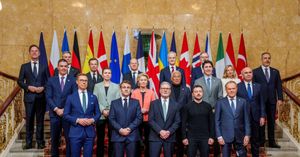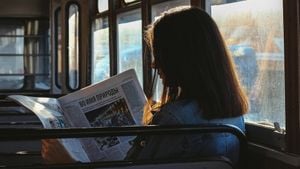Legal troubles seem to follow Elon Musk like a shadow, and his recent actions surrounding OpenAI, the company he helped to found, have intensified this scrutiny, especially with the inclusion of Microsoft as part of his latest legal maneuvers. What's happening here is not just another day in court; it's about the very fabric of competition—and Musk's allegations come loaded with potential consequences for the tech industry.
Elon Musk’s latest lawsuit, filed on November 15, 2024, expands upon previous complaints against OpenAI and now includes Microsoft over claims related to antitrust behavior aimed at monopolizing the generative AI sector. This amended complaint was lodged with the federal court located in Oakland, California, and it’s raising eyebrows across legal and business communities alike.
According to Reuters, Musk's broadened complaint accuses OpenAI, which transitioned from its initial nonprofit structure to become part of the generative AI powerhouse valued at around $157 billion, of prioritizing profits over public good—a shift Musk argues is contrary to the organization’s original mission. He claims the modifications made by OpenAI and Microsoft have dangerously suffocated competition, giving rise to what he describes as "market-paralyzing gorgon" tactics within the industry.
Musk’s central claim hinges on the premise of illegal collaboration between Microsoft and OpenAI to restrict potential competitors, especially those who might act against their combined interests. He argues these practices amount to unlawful monopolization and manipulative investments aimed at sidelining potential rivals.
His lawyers are seeking not just declarations but actionable changes. Their demands include nullifying OpenAI’s licensing deals with Microsoft and pursuing the divestment of any assets obtained through what Musk’s team deems improper practices. It’s important to note how intertwined the two companies are; their collaboration has sparked discussions not only about innovation but also about who gets to play the game.
Microsoft, curiously silent on details surrounding the lawsuit, is still reeling from its own accusations of unfair play. Meanwhile, OpenAI has dismissed Musk’s assertions as "even more baseless and overreaching than previous ones," indicating they see these actions as little more than Musk trying to deride the company he co-founded.
Stepping back, Musk’s connection to OpenAI is layered. He was there at the beginning when it was founded with lofty aims of fostering safe AI to benefit humanity. But as the organization morphed over the years, securing multi-billion dollar investments—most significantly from Microsoft—Musk distanced himself, often critiquing the priorities of the organization.
Some industry experts caution against the dangers of concentrating significant AI capabilities within the hands of just a few entities. Musk’s lawsuit highlights this unease, representing broader concerns about how this concentration could play out for competition and innovation.
The legal challenge doesn’t stop with Musk himself. Philadelphia’s district attorney, Larry Krasner, recently filed his own lawsuit against Musk, questioning the legality of his high-profile $1 million-a-day giveaway aimed at encouraging voter registration. Krasner contends this initiative constitutes an illegal lottery, putting Musk’s actions under additional legal scrutiny.
Musk’s initiative, which has been criticized for potentially serving partisan interests—specifically to bolster former President Donald Trump’s electoral chances—complicates the entire narrative surrounding his public engagements. Launched on October 19, the promotional effort tied cash incentives to voter registration, aimed particularly at swing states where electoral participation could tip the scales.
Critics, including Krasner’s legal team, argue Musk’s giveaway constitutes much more than mere motivation for civic participation; they see it as veiled commercial exploitation of the democratic process. Their lawsuit explicitly contends the giveaway might violate Pennsylvania law, as it exploits unsuspecting residents under the guise of enhancing electoral engagement.
The initial hearing over this lawsuit revealed Musk’s absence—from the courtroom and from direct accountability. Despite being ordered to appear, he opted instead to request the case be transferred to federal court just hours before the hearing commenced. The judge ruled for the hearing to proceed but reserved judgment on what consequences, if any, Musk might face for failing to show.
Legal analysts dissecting Musk's actions suggest the tussle reflects larger issues of trust and fairness within election systems, exacerbated by significant financial incentives which could mislead voters about the integrity of the electoral process. Federal law explicitly prohibits paying individuals for their vote or registration, bringing to light ethical dilemmas surrounding Musk's initiatives.
Back to Musk's lawsuit against OpenAI and Microsoft, his assertion of monopolization resonates loud and clear as he argues these exclusive licensing agreements and collaborative practices practically create barriers for new entrants to the market. This approach, he claims, effectively grants the two companies excessive control over AI technologies, crippling any potential competition before it can take root.
Despite this legal storm, Microsoft’s board remains tight-lipped, staying mostly on the sidelines as Musk continues his dramatic legal shifts. Interestingly enough, his attorney pointedly remarked, "Sunlight is the best disinfectant," calling for needed transparency within these titanic firms—Musk’s words echoing the growing public desire for greater scrutiny of corporate dealings, especially within influential industries like AI.
The coming months could prove pivotal, not just for Musk and his contentious relationship with OpenAI, but also for how laws governing fair competition and electoral integrity are interpreted and enforced. With trial dates approaching and public opinion fluctuants, both Musk’s accusations and Krasner’s lawsuits are set to lay bare the capacities and limitations of existing regulations.
Legal experts predict this confrontation could lead to stricter regulations or guidelines governing not just tech company collaborations but also how innovative political campaigning is executed. Whether this might serve as a wake-up call for the tech industry remains to be seen, but one thing is certain: the legal battles surrounding Elon Musk and OpenAI are far from over.



